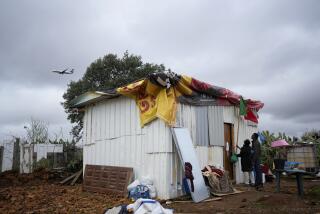Macao hit by growing pains
- Share via
MACAO — The casinos shimmer in the smoggy skyline like blocks of golden ice, walling off the century-old colonial buildings and dense working-class neighborhoods perfumed with Portuguese-inspired bakeries.
The two dozen gambling houses and luxury hotels have ignited an economic boom in this territory of half a million residents that last year dethroned Las Vegas as the most lucrative gambling destination in the world, according to figures released by the cities’ gaming authorities.
But working-class citizens say the 60% rise in gross domestic product and the glamour and lucre of the casino industry have brought corruption and inflation, pushing the cost of housing and necessities out of the reach of their paychecks.
Public dissatisfaction had remained relatively muted until May 1 when the usually sleepy streets of Macao, the former Portuguese colony that is now governed by China, were pierced by the sound of police gunshots.
An officer trying to hold back thousands of union marchers protesting government corruption fired shots into the air, one of which is suspected of injuring a passing motorcyclist nearly 1,000 feet away.
As the march continued, officers used pepper spray and batons to control the crowd. Dozens of protesters and 21 police officers were injured, authorities said.
Within days, the government, led by Chief Executive Edmund Ho, tried to quell public anger by promising to investigate the shooting, to crack down on graft and to boost available public housing. Ho also pledged to increase government transparency, a response to complaints about how little was known about how developers were awarded Macao’s much-coveted land.
At the forefront of the protest were local construction workers. They say the swelling ranks of illegal migrant laborers from the mainland, estimated to constitute nearly a third of the workforce, have suppressed wages. They accuse corrupt officials of ignoring these so-called black-market workers because of the city’s well-documented labor shortage and pressure to maintain Macao’s staggering growth.
“The wealthy are getting wealthier and the poor are getting poorer,” said Camoes Tam Chi-keung, an instructor of journalism at the University of Macao. “There’s always been corruption here with the Portuguese but not as serious as now. There’s too much money coming too fast. Most Macao people don’t have the ability to handle it.”
One of the largest cases to draw the public’s ire was the arrest in December of Ao-Man Long, a transportation official charged with graft after he was discovered holding assets worth about $100 million, which according to reports included stashes of jewelry, luxury watches and expensive wine.
The scandal and the recent protest have diminished Ho’s image and raised doubts about whether he will have enough clout to influence who his successor will be when his second and final term ends in 2009.
The chief executive of Macao, which is governed as a special administrative district of China, is chosen by a 300-member electoral committee.
As the Macao government tries to enact reforms, the casino industry continues to expand, with the addition of American stalwarts such as Las Vegas Sands Corp., which is scheduled to open the Venetian-Macao this summer. The casinos helped attract 22 million tourists last year, half of them from China.
Inside the opulent halls, visitors gamble the Chinese way -- on higher stakes tables, not slot machines. The bars are often empty. Tea and sandwiches are passed around. Macao earned $7 billion last year in gaming revenue playing this way, $300,000 more than Las Vegas, even though Macao, an 11-square-mile peninsula, has 70 fewer casinos than its sprawling Nevada competitor.
Outside, however, many locals fear that unbridled development is erasing the charm and character of Macao’s history.
“The old system is lost,” said Ho Heung Kok, president of the Macao Worker’s Union and one of the May Day protest’s chief organizers. “Macao’s prosperity is built on the bankruptcy of many people. It takes the blood, sweat and money of mainland Chinese to keep up Macao’s neon lights.”
Inside Leitaria I Son, a 120-year-old cafe in Senado Square that is famed for its steamed custards, manager Ha Sah Wan said casino revenue had given the government money to improve infrastructure and lower taxes.
“The change is drastic,” said Ha, 49, who shouted ticket orders for pork chop buns back to his kitchen staff. “Businesses like me all benefit from all these travelers from China.”
But there’s also the higher cost of doing business. Ha had to add one pataca -- Macao’s unit of currency, equivalent to about 12 cents -- to the prices of many of his dishes last fall. He gave his waiters raises, though he admits it will do little to help them make ends meet.
“Even if I raised prices again, I still can’t make up for the change in the cost of living,” Ha said.
The ones who suffer the most are those at the bottom rung of Macao’s economy.
Wong Mei Iong, a former housekeeper who is relying on a disability check, has been told she has to vacate her apartment, where rent has risen by a third to the equivalent of $248 a month. Every comparable apartment she’s seen so far costs nearly $100 a month more, she said.
“Of course I don’t have enough,” said Wong, 59, who has an estranged daughter who gambled her savings away and fled to China.
“My family needs to eat,” she said. “Even groceries are more expensive now. I have to cross the border to China now to buy cheaper fish and vegetables.”
*
More to Read
Sign up for Essential California
The most important California stories and recommendations in your inbox every morning.
You may occasionally receive promotional content from the Los Angeles Times.














